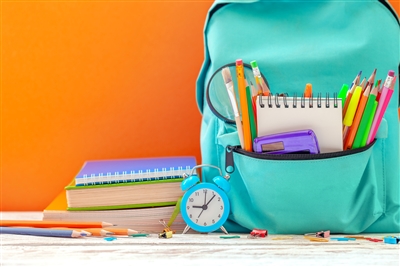The five things each child needs to bring to school

When I attended secondary school back in the 1970`s I would transport my textbooks and pens - the paraphernalia of learning - from class to class in a heavy briefcase. So heavy was this case that my hands today faintly bear the callouses from carrying it to school, from class to class, and back home. I can recall the day my slide rule was displaced by a newfangled electronic calculator, and when my bottle of ink gave way to convenient fountain pen cartridges, which had far less tendency to leak over my exercise books. I was a meticulous pupil, always careful to ensure I packed my case correctly each evening. To arrive at school without everything you needed for the day was a grievous offence, and one that more careless pupils were regularly punished for. In the spirit of sharing my methodical ways, here are the five most important things every pupil should make sure they bring to school:
1. Pupils needs to ensure they pack all the text books and exercise books required for each lesson. This may sound obvious, but throughout my teaching career I was constantly dismayed at the number of students who failed to bring their books to class. Their negligence would cause lessons to be disrupted, as I would be required to find extra reading and writing paraphernalia. Perhaps this is less of a problem these days, as students can easily view their time tables on their smartphones, or even the school website.
2. Students must ensure they bring with them all the stationary they will need for the day`s lessons. This will of course include pens and pencils, but might also feature more specialised instruments, such as rulers, protractors and stencils. Schools will of course have many of these items, but lessons will run a lot more smoothly if the pupils check what classes they have, and bring in with them everything they need for their lessons.
3. Any students afflicted with a medical condition must make sure they bring their medication with them. Each school will have its own policy regarding the health care of its students, and will be aware of those pupils with allergies, or other conditions such as diabetes or asthma. The school nurse will probably have an insulin injection, or a nebuliser, but it will be the personal responsibility of the student to bring in their own medication, which they can immediately administer should they feel the need to do so.
4. In a perfect world pupils would not need to bring any money into school, but depending on their personal circumstances, they may need to pay for their lunch and travel, so it is important that pupils have enough funds for each day. No child should ever go hungry, and if they have left home without enough money, they can tell a teacher, who will make sure they still receive a meal; but it will certainly easier if students try to remember to bring enough money with them.
5. This last point may sound a little idealistic and vague, but each pupil needs to try to bring an ; attentive and positive attitude to class. Only with this mental attitude will they be fully receptive to their lessons, and in a position to learn at their full capacity. This positive outlook ; can only be attained if the child has had sufficient sleep and a good breakfast. When I was a teacher I would have a number of pupils arriving hungry to school every single day, who were in no physical state to give their full attention to what I was teaching. Pupils not getting enough sleep was also a major problem, and with the ubiquity of mobile phones, a distraction that was fortunately not around during my career, I can only imagine pupils are getting even less rest.

 Add a Comment
Add a Comment